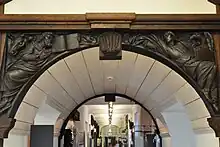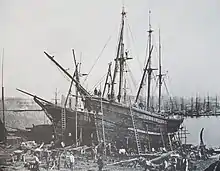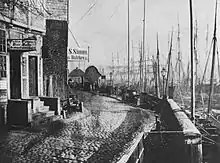Carl Friedrich Höge | |
|---|---|
| Born | 2 July 1834 |
| Died | 23 January 1908 (aged 73) |
| Occupation(s) | Photographer and Entomologist |
Carl Friedrich Höge (1834–1908), also written Carl Frederik Hoege, was a German photographer and entomologist.
Biography
Höge was born in Hamburg, Germany on 2 July 1834.[1][2]
His first job was as a confectioner before becoming a professional photographer.[2] He made entomological collections in Lapland and three collecting trips to Mexico (1879–1880, 1885–1886 and 1896).[2] Höge's trips to Mexico were made on behalf of his friend, the banker and entomologist Julius Flohr (1837–1896).[3]
Höge died in Hamburg on 23 January 1908.[1]
Entomology
Höge is credited as one of the entomologists whose Coleoptera material was used for Frederick Godman and Osbert Salvin's project Biologia Centrali-Americana—the beetles Höge had collected in Mexico were worked on by Henry Walter Bates.[4]
The Mexican Carabinae beetle subspecies Calosoma digueti hoegei Breuning, 1928 was named in honour of Höge.[5]
.jpg.webp)



Photography
Höge had a photography studio at 28 Alter Wandrahm, Hamburg,[6] as can be seen from the address printed on a Höge cabinet card (collection of the British Museum).[7] In 1886, Höge's photography business was based at 41 Schäferkampsallee, Hamburg.[8]
References
- 1 2 "Carl Friedrich Höge in the Hamburg, Germany, Deaths, 1874-1950". ancestry.co.uk. Retrieved 7 May 2023.
- 1 2 3 Horn, Walter (1908). "Aus der entomologischen Welt: I: Totenliste". Deutsche entomologische Zeitschrift (in German): 428–429 – via Biodiversity Heritage Library.
- ↑ Schaufuß, Camille (14 May 1908). "Rundschau". Entomologisches Wochenblatt (Insekten-Börse). 25 Jahrgang (20): 84 – via Biodiversity Heritage Library.
- ↑ Bates, Henry Walter. "Insecta: Coleoptera". Biologia Centrali Americana. I (I): iii – via Biodiversity Heritage Library.
- ↑ "Calosoma (Carabomimus) digueti". www.calosomas.com. Retrieved 2023-05-07.
- ↑ "The British Museum: Biography: Carl Friedrich Höge". www.britishmuseum.org. Retrieved 7 May 2023.
- ↑ "photographic print (black and white); cabinet card - British Museum". The British Museum. Retrieved 2023-05-08.
- ↑ Hamburgisches Adress-Buch für 1886 (in German). Hamburg: Hermann. 1886. p. 161.